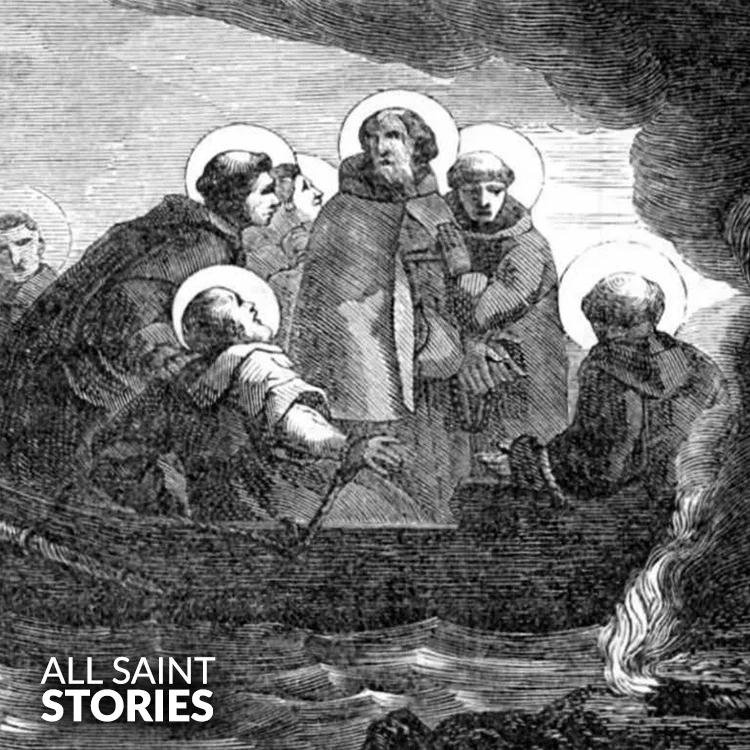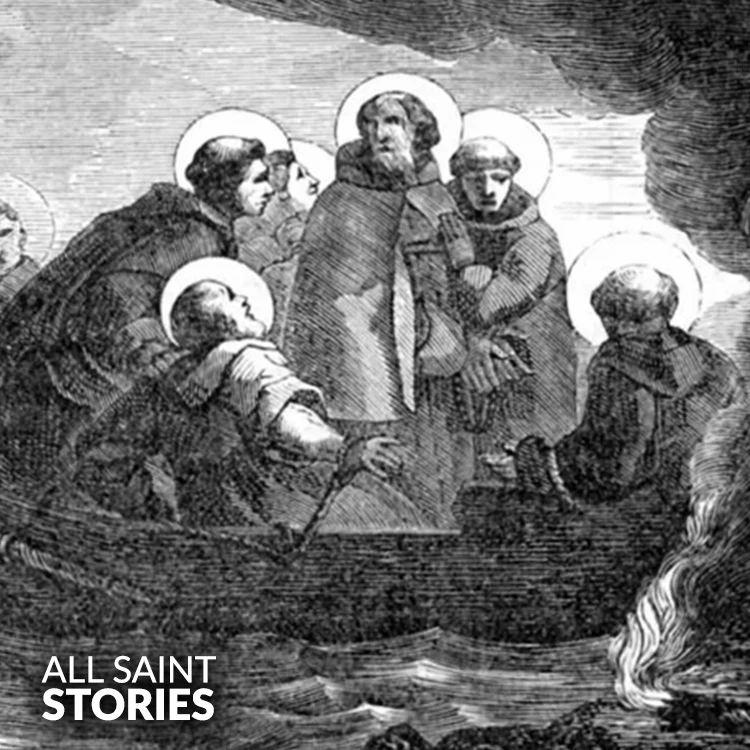"Saint Liberatus and holy monks, intercessors of faith and courage, we ask for your prayers and guidance. Through your steadfast devotion, may we find strength in our trials, peace in our hearts, and clarity in our path. Help us to live with the same love and faith that you showed in your service to God. Amen."
ST. LIBERATUS AND SIX MONKS (MARTYR)
ST. LIBERATUS AND SIX MONKS (MARTYR)

St. Liberatus and his six companions were early Christian martyrs who suffered for their faith during the persecution of Diocletian in the early 4th century. Arrested and tortured for refusing to renounce Christ and worship pagan gods, they remained steadfast, ultimately being executed for their beliefs. They are remembered for their courage and unwavering commitment to Christianity.
St. Liberatus was a Christian priest or monk, and along with six of his fellow monks, they lived in North Africa during the early years of the 4th century. During this period, Emperor Diocletian initiated one of the most severe persecutions of Christians. The imperial authorities demanded that all citizens, including Christians, offer sacrifices to Roman gods as a demonstration of loyalty to the empire. Those who refused were subjected to intense torture and, in many cases, execution.
St. Liberatus and his companions, steadfast in their faith, refused to comply with these demands. They were arrested and brought before the local authorities. Despite the pressure and the threats of death, they remained unwavering in their commitment to Christ. The details of their specific trials are not fully documented, but the core of their story is a testimony to their unwavering belief and courage in the face of intense persecution.
Following their arrest, the monks were subjected to various forms of torture meant to break their resolve. It is said that they were beaten, starved, and forced to witness the suffering of others who had renounced their faith. However, none of them relented. Their refusal to sacrifice to the Roman gods sealed their fate. They were sentenced to death.
The exact manner of their execution is not entirely clear from historical records. However, the tradition holds that St. Liberatus and his companions were martyred for their refusal to renounce Christianity. They were likely executed in North Africa, a region that saw many early Christian martyrs. Their courage in the face of death helped to inspire the early Christian community to remain firm in their faith despite the brutal persecution.
The memory of St. Liberatus and his companions lived on in the Christian community, and they were venerated as martyrs. Their feast day is celebrated on July 17 , the day of their death, to honor their sacrifice for the faith. Though little is known about their birth or early lives, their steadfast witness to Christ continues to serve as a powerful example of faith, courage, and devotion.
Over time, their story became a source of inspiration for many Christians, particularly those facing persecution. Their martyrdom was remembered as a pivotal moment in the history of early Christianity. Their feast day serves as a reminder of the countless Christians who have given their lives for their faith, showing that the strength of belief can transcend even the most severe trials.
Though no formal canonization process occurred for St. Liberatus and his companions, they have been venerated as saints and martyrs of the early Church. Their names are still remembered in liturgical prayers and celebrations, and their lives continue to inspire those who face adversity for their faith.
Video Not Found
The information on this website is compiled from various trusted sources. While we aim for accuracy, some details may be incomplete or contain discrepancies.
If you notice any errors or have additional information about this saint, please use the form on the left to share your suggestions. Your input helps us improve and maintain reliable content for everyone.
All submissions are reviewed carefully, and your personal details will remain confidential. Thank you for contributing to the accuracy and value of this resource.
Credits & Acknowledgments
- Anudina Visudhar (Malayalam) – Life of Saints for Everyday
by Msgr. Thomas Moothedan, M.A., D.D. - Saint Companions for Each Day
by A. J. M. Mausolfe & J. K. Mausolfe - US Catholic (Faith in Real Life) – Informational articles
- Wikipedia – General reference content and images
- Anastpaul.com – Saint images and reflections
- Pravachaka Sabdam (Malayalam) – Saint-related content and insights
We sincerely thank these authors and platforms for their valuable contributions. If we have unintentionally missed any attribution, please notify us, and we will make the correction promptly.
If you have any suggestion about ST. LIBERATUS AND SIX MONKS (MARTYR)
Your suggestion will help improve the information about this saint. Your details will not be disclosed anywhere.
© 2026 Copyright @ www.allsaintstories.com



 English
English
 Italian
Italian
 French
French
 Spanish
Spanish
 Malayalam
Malayalam
 Russian
Russian
 Korean
Korean
 Sinhala
Sinhala
 Japanese
Japanese
 Arabic
Arabic
 Portuguese
Portuguese
 Bantu
Bantu
 Greek
Greek
 German
German
 Dutch
Dutch
 Filipino
Filipino